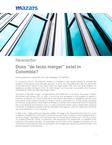
Does "de facto merger" exist in Colombia?
In a previous column, we analyzed whether in Colombia it was legally feasible to consider the existence of the figure of the "de facto spin-off", to which we concluded that it was not, due to the formal and solemn nature of such figure within our legal system. We must now study whether it is feasible to consider the figure of the "de facto merger", as it has been conceived by the American jurisprudence, within the Colombian legal system.
The figure of "de facto merger", as described by John Matheson in his article "Successor Liability" (Minnesota Law Review; 2011, p. 383), is one of the four exceptions to the limitation of liability in business succession, the others being fraud, the express assumption of obligations and the mere continuation of the company through a change of name or corporate form. In other words, according to American jurisprudence, the principle of limitation of liability, as a fundamental axiom of corporate law, is not absolute and therefore, even in a sale of business assets, where initially there would be no transfer of obligations, liability could be extended to the acquirer, under the legal fiction that what has occurred there is, in fact, a merger.
In New York v. National Service Industries (2006), the judge of the Second Circuit of the U.S. Court of Appeals indicated that a transaction structured as a purchase of assets could be categorized as a "de facto merger", regardless of the fact that it was not formally structured as such. This occurs if four (4) conditions are met, namely: (i) continuity in the ownership of the assets sold, (ii) cessation of the business in the selling company, (iii) assumption by the buyer of the obligations necessary for the continuation of the business and, (iv) continuity in the management, personnel, physical location and general operation of the business.
According to Matheson, this doctrine contradicts the corporate thesis of "independent legal significance" established in Applebaum v. Avaya (Del. 2002) according to which a transaction carried out under a certain legal institution (such as the sale of assets) could not be interpreted under the rules of another legal institution (such as a merger). Notwithstanding the above, according to Matherson, even the courts and legislation of Delaware, the "pro-corporate" bastion of North America, have accepted the de facto merger thesis as an exception to the limitation of liability, but never as a mechanism to grant additional rights to shareholders ("dissent and appraisal rights").
This thesis, although interesting, is not applicable in Colombia due to the mandatory nature of the commercial law on mergers, which makes the extensive interpretation of this corporate figure impossible. On the one hand, Article 172 of the Code of Commerce expressly and emphatically establishes that "there will only be a merger when one or more companies are dissolved, without being liquidated, to be absorbed by another or to create a new one". Thus, in accordance with the provisions of Article 27 of the Civil Code, applicable to commercial operations by virtue of the provisions of Article 822 of the Commercial Code, "When the meaning of the law is clear, its literal tenor shall not be disregarded under the pretext of consulting its spirit".
On the other hand, according to Vaie Lustgarten (Fusión y escisión de Sociedades, Temis, 2014, p. 5), from the analysis of article 172 of the Code of Commerce it is possible to conclude that only legal persons of corporate nature can take part in this type of operations, so it is not possible for natural persons, de facto corporations or non-profit entities to take part in them. Given this substantial restriction in the universe of the addressees, it would be unthinkable to "transplant" this thesis of the American Courts to our corporate law.


